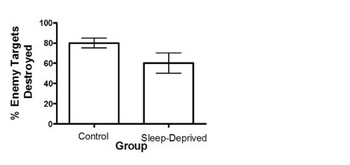
Question: A psychologist was interested in the effects of sleep deprivation on performance on a vigilance task. Forty college students served as participants and were placed in either the sleep-deprivation group or the control group by coin flip. Both groups spent the night before the study in a sleep laboratory, but only the control group was allowed to sleep. By the next morning, the sleep-deprived group had been awake for the last 24 hours. At this time, both groups were provided a nutritious breakfast and, shortly thereafter, testing began in sound-attenuating cubicles, each equipped with a computer. The vigilance task consisted of monitoring the computer screen. Participants were instructed that red dots represented allied spacecraft and green dots represented enemy spacecraft. Throughout the 2-hour-long task, red dots moved across the screen in irregular patterns. Occasionally and unpredictably, a green dot would quickly move across the screen in a haphazard pattern. When a green dot appeared, the task of the participant was to move a stylus over the green dot and press a button, "destroying" the enemy spacecraft. The psychologist measured the percentage of these enemy targets that were detected and destroyed.
The results of this fictitious experiment are shown in Figure 2.2.
Figure 2.2
Part 1 Vigilance was measured as the percentage of enemy targets destroyed. As a measure of vigilance, this illustrates:
Group of answer choices
A An operational definition
B: Reliability
C: Statistical significance
D: A construct
Part 2 Assuming the differences between groups were statistically significant, before concluding that sleep deprivation impairs vigilance, another dependent variable the researchers probably would want to analyze is:
Group of answer choices
A: The number of times participants incorrectly destroyed an allied spacecraft.
B How well the task resembles real-world instances of sustained vigilance.
C The effects of longer or shorter periods of sleep deprivation on vigilance.
D The effect of breakfast on performance on the vigilance task.

Trending nowThis is a popular solution!
Step by stepSolved in 4 steps

 Ciccarelli: Psychology_5 (5th Edition)PsychologyISBN:9780134477961Author:Saundra K. Ciccarelli, J. Noland WhitePublisher:PEARSON
Ciccarelli: Psychology_5 (5th Edition)PsychologyISBN:9780134477961Author:Saundra K. Ciccarelli, J. Noland WhitePublisher:PEARSON Cognitive PsychologyPsychologyISBN:9781337408271Author:Goldstein, E. Bruce.Publisher:Cengage Learning,
Cognitive PsychologyPsychologyISBN:9781337408271Author:Goldstein, E. Bruce.Publisher:Cengage Learning, Introduction to Psychology: Gateways to Mind and ...PsychologyISBN:9781337565691Author:Dennis Coon, John O. Mitterer, Tanya S. MartiniPublisher:Cengage Learning
Introduction to Psychology: Gateways to Mind and ...PsychologyISBN:9781337565691Author:Dennis Coon, John O. Mitterer, Tanya S. MartiniPublisher:Cengage Learning Psychology in Your Life (Second Edition)PsychologyISBN:9780393265156Author:Sarah Grison, Michael GazzanigaPublisher:W. W. Norton & Company
Psychology in Your Life (Second Edition)PsychologyISBN:9780393265156Author:Sarah Grison, Michael GazzanigaPublisher:W. W. Norton & Company Cognitive Psychology: Connecting Mind, Research a...PsychologyISBN:9781285763880Author:E. Bruce GoldsteinPublisher:Cengage Learning
Cognitive Psychology: Connecting Mind, Research a...PsychologyISBN:9781285763880Author:E. Bruce GoldsteinPublisher:Cengage Learning Theories of Personality (MindTap Course List)PsychologyISBN:9781305652958Author:Duane P. Schultz, Sydney Ellen SchultzPublisher:Cengage Learning
Theories of Personality (MindTap Course List)PsychologyISBN:9781305652958Author:Duane P. Schultz, Sydney Ellen SchultzPublisher:Cengage Learning





